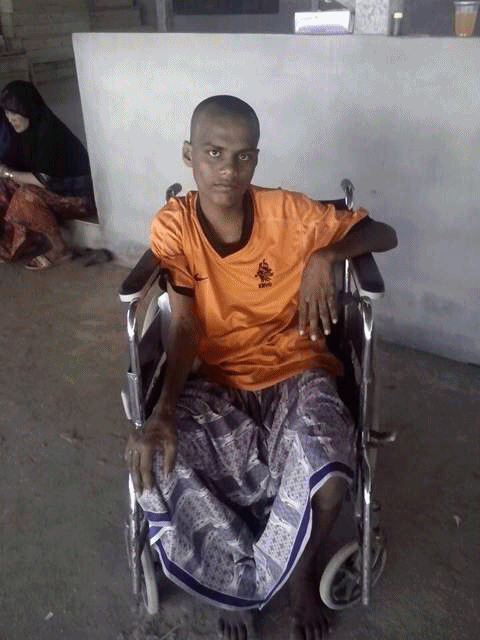February 6, 2014
PHUKET: A group of 24 men who could not walk without help were simply left in the jungle when Thai authorities ''rescued'' more than 700 Rohingya from traffickers' camps last month, according to activists.
The men were disabled by lengthy and cramped imprisonment in Thai Immigration cells where they were unable to stretch and move, said Isma-Aen Mat-Adam, of the Rohingya Help Network in Thailand.
The 24 were first ''rescued'' by officials in January 2013 from secret jungle camps, kept in Immigration cells for many months, ''deported'' from Thailand, trafficked south on boats again and last month ''rescued'' a second time from different jungle camps.
Unlike the 700 other Rohingya apprehended in the raids on the two secret camps, the 24 men were unable to walk. So, according to Khun Isma-Aen, the disabled men were simply left to fend for themselves in the jungle in southern Thailand.
''The men are now being cared for at a mosque near Baan Hau Kon in Songkhla province,'' he said.
Thai authorities will be asked whether they plan to care for the 24 or whether they will simply be discarded as victims of the present secretive policy on processing boatpeople from Burma (Myanmar) through Thailand.
Thousands of Rohingya are fleeing ethnic cleansing in a forced exodus that the Burmese government appears unwilling to halt.
Authorities in Thailand tolerate the trafficking of the Rohingya through to Malaysia despite accusations that deaths and rapes occur in the secret jungle camps.
The damage inflicted on two dozen man who can no longer walk without help provides a new reason for Thai authorities to look again at what's happening.
''Why are you going to let people suffer in your country like this?'' asked Khun Isma-Aen, who hopes the group will win support from a Malaysian NGO.
The question of whether Thailand will support stateless people who are permanently incapacitated while being trafficked through Thailand was first raised over a pickup crash near Sadao, in Songkhla province, on January 2.
One man was killed and three others are still being treated in hospital with a strong chance they will require specialist care for the rest of their lives. Doctors are questioning who is going to be held responsible.
Raids on jungle camps that freed hundreds of Rohingya in January 2013 and again last month appeared to be designed to convey the impression that action is being taken against the traffickers.
Separate investigations by Phuketwan and Reuters journalists indicate the ''deportation'' of Rohingya from the Thai-Burma port of Ranong is a subterfuge.
The boatpeople are quickly transferred to traffickers who sail south and deposit the sanctuary-seekers in the secret jungle camps once again.



Comments